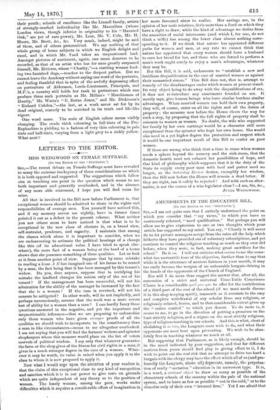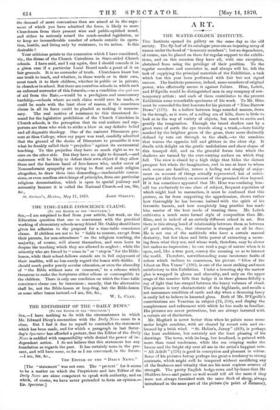AMENDMENTS IN THE EDUCATION BILL.
[To THE EDITOR OF THE "SPECTATOR."] SIR,—ram not quite sure that I entirely understand the point on which you consider that "my views," to which you have so
courteously referred, "need qualification." But perhaps you will allow me to give expression to one or two thoughts which your article has suggested to my mind. You say, "Clearly it will never do to let private managers accept from the rates all the help which hitherto they have provided out of voluntary subscriptions, and yet continue to control the religious teaching as much as they ever did before, when they were, in fact, making great sacrifices for the
school." Be it so. I will not criticize what seems to me the some- what too mercantile tone of the objection, further than to say that while it is the utterance of anxious fairness in your mouth, it may too easily become the weapon of an unbearable bargain-driving in the hands of the opponents of the Church of England.
Nor will I do more than suggest the answer that, after all, the concession of a strict and universal Time-Table Conscience Clause is a considerable quid pro quo to offer for the contribution of a third part of the cost of the school (if we must needs discuss it in this shop-keeping spirit), inasmuch as it amounts to the easy and complete withdrawal of any scholar from any religious, or religiously-related, lesson, and to that considerable extent gives up the " entire control" to which you demur. To do more is, it seems to me, to go in the direction of putting a premium on the least strictly religious, and a stigma on the most strictly religious, type of religious teaching in our schools. And this is what, short of abolishing it in lobo, the Leaguers most wish to do, and what their opponents are most bent upon preventing. We wish to be abso- lutely free in teaching whatever we teach at all.
But supposing that Parliament, as is likely enough, should ba in the mood indicated by your suggestion, and that far different motives from yours should find play in giving effect to it, I do wish to point out the real risk that an attempt to drive too hard a bargain with the clergy may have the effect which all of us (and pro- fessedly the Leaguers, above all) deprecate, namely, the perpetua- tion of really " sectarian " education in its narrowest type. It is, in a word, a national object to draw as many as possible of the elementary schools of the country within the pale of the national system, and to leave as few as possible " out in the cold," or to the stimulus only of their own "internal fires." Yet I am afraid that
the demand of more concessions than are aimed at in the argu- ment of which you have admitted the force, is likely to scare Churchmen from their present wise and public-spirited mood, and either to seriously retard the much-needed legislation, or to keep no inconsiderable number of schools outside its opera- tion, hostile, and living only by resistance, to its action. Is this desirable ?
Your criticism points to the concession which I have considered, viz., the disuse of the Church Catechism in State-aided Church schools. I have said, and I say again, that I should concede it in a given case if a particular Local Board made a point of it on fair grounds. It is no surrender of truth. Churchmen know but one truth to teach, and whether, in those words or in their own, must teach it to their children, whether in public or in private, in church or in school. But there are countless schools in which such an enforced surrender of this formula,—as a condition sine qua non of aid from the Rate,—would be a prodigious and unnecessary hardship,—schools where no such claim would ever be made, or could be made with the least show of reason, if the conscience clause in all its force could be pleaded as making it unneces-
sary. The real motive of resistance to this threatened de- mand for the legislative prohibition of the Church Catechism in Church schools, is the perception that its real authors and sup- porters are those who wish to strike a blow at any definite belief and all dogmatic theology. One of the eminent Dissenters pre- sent at Sion College, when my paper was read, candidly admitted that the ground of the desire of Dissenters to proscribe it was what he frankly called their " prejudice " against its sacramental teaching. To this prejudice they have as much right as we to ours on the other side. But they have no right to demand,—and statesmen will be likely to defeat their own object if they allow them and the factious baud of free-lances who, under cover of Nonconformist sympathy are trying to flout and snub religion altogether, to draw them into demanding,—inadmissible conces- sions, or even needless stretchings of principles, from one particular religious denomination, which is open to special jealousy and animosity because it is called the National Church.—I am, Sir, &c., St. Saviour's, Horton, May 11, 1870. JOHN OAKLEY.































 Previous page
Previous page